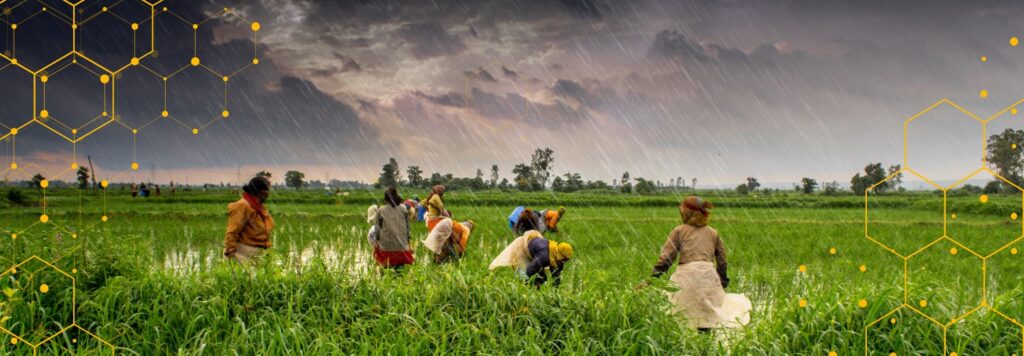19% Rural Districts at ‘Very High-risk’- Why Climate-smart Agriculture is a Must

Climate-smart agriculture is the need of the hour. As climate change becomes more severe, India’s agricultural growth is being threatened with dry spells, heat waves, pest attacks, and erratic rainfall. The new realities set by these drastically varying weather conditions have highlighted the importance of adopting climate-smart agricultural practices. Climate-resilient farming practices can ensure that your cropping cycles and farm operations are protected from the ill-effects of climate change.
Climate change has been constantly affecting the Indian agriculture ecosystem in the form of increasing temperatures, weather variability, and growing crop diseases. This is reducing the quality of crop yields as well as impacting the nutritional value of major crops. A strengthened focus on adaptation is thus essential in order to improve your food security efforts and enhance resilience to weather variabilities.
19% of the Indian rural districts are extremely vulnerable to climate change and have been termed as ‘very high-risk’ districts as per the vulnerability assessment of Indian agriculture to climate change.
The assessment was conducted by the Indian Council of Agricultural Research (ICAR) and involved 573 rural districts of India (excluding the Union Territories of Andaman and Nicobar Islands, Lakshadweep). 201 rural districts that are slightly less vulnerable to climate change than the ‘very high-risk’ districts have been categorised as ‘risk districts’.
Information related to maximum temperature estimations of various districts was shared in the Lok Sabha on 9th February 2021. It stated that maximum temperature will increase by 1-1.3 degree celsius in 256 districts and by 1.3-1.6 degree celsius in 157 districts (2020-2049).
The effect of climate change on various crops in Indian agriculture was studied under National Innovations in Climate Resilient Agriculture (NICRA). This study has projected that –
- Rainfed rice yields in India will reduce marginally (<2.5%) in 2050 and 2080.
- Irrigated rice yields will reduce by 7% in 2050 and 10% in 2080.
- Wheat yield will reduce by 6-25% and maize yields by 18-23% by 2100.
- The climate in the future will be conducive for chickpea and will increase their productivity (23-54%).
Vulnerability Assessments – Address Grave Risks of Climate Change
Information regarding the climate change impact on Indian agriculture was shared by the Union Minister of Agriculture and Farmers Welfare in the Lok Sabha recently. It has shed light on the dreadful situation of Indian rural districts that are highly impacted by the varying climatic conditions.
Adaptation is pertinent when it comes to better preparing and reacting to climate changes. Vulnerability assessments can identify potential climate risks and help in strengthening the resilience of agriculture against varying weather patterns. These assessments can also be beneficial as planning tools to improve the decision-making process in agriculture.
Vulnerability assessments can help you identify climate risks and their impacts on agriculture in an accurate manner. An adaptation response based on this assessment can be highly effective in powering your climate-smart agricultural practices. It can help in devising the right strategies to successfully mitigate the adverse impacts of climate change on your farming activities.
Capitalise On Farm Management Platforms to Avail Climate-smart Advisory
Changing weather patterns are constantly influencing the water and nutrient proportion in the soil. This is taking a toll on crop productivity by resulting in field conditions that may not be suitable for the growth of certain crops. Predicting and analysing the weather conditions prior to growing a crop has thus become quite essential.
These factors have highlighted the need for Indian farmers to choose their crops wisely going forward. The intensity of weather events and their impact on agricultural activities differ across different regions. Climatic factors like temperature, rainfall, humidity, etc thus need to be analysed accurately in order to help farmers in growing the right crops.
Farm management platforms can provide agribusinesses with high-tech agriculture consulting services. This can help agribusinesses with climate-smart advisory offerings to up their climate-smart agriculture game. It can simplify the assessment of all climatic parameters as well as field conditions to determine the best crop that can be grown on their field. It can also assist agribusinesses with climate-smart agricultural practices to enhance the productivity of their crop yields. This can help farmers in choosing and cultivating a crop that is well-suited to grow in a healthy manner as per the predicted weather conditions.
How ERP Can Reduce Temperature Threats through Crop Rotations
Rising greenhouse emissions are increasing temperatures and compounding stress on crops by enhancing the potential of pest attacks and diseases. The yield quality of crops is deteriorating with the increased threat of pests as well as extreme heat pressure. Escalating temperatures can also lead to significant reductions in the availability of land that is suitable for agriculture.
ERP software platforms can help you ensure climate-resilient farm production and management through smart crop rotations. It can be an effective climate-smart agricultural measure to increase yields and lower greenhouse gas emissions. This can not only help in decreasing the rising temperature challenges but also keep dangerous pest attacks under control.
The crop rotation method can enable growers to grow various crops resistant to adverse climate conditions on a single piece of land. By mitigating climate change threats such as varying rainfall patterns, droughts, fluctuating temperatures, crop rotations can thus bolster your climate-smart agriculture efforts.
Agritech – Charting the Climate-resilient Route for Indian Agriculture
The growing weather uncertainties have made it very difficult to solely rely on traditional agricultural know-how to carry out farm functions. Adopting tech-driven climate-smart agricultural techniques can help growers employ a more predictable and data-driven approach towards cultivation.
The use of weather stations can assist agribusinesses in predicting erratic weather patterns to plan their cultivation cycles efficiently. Continuously monitoring weather conditions with the help of IoT devices and sensors can also help in implementing sustainable soil management practices.
The incorporation of agricultural drones and agribots can pave the way for renewed accuracy and efficiency in your climate-smart agricultural practices. IoT-driven agriculture, along with farm analytics, can bring extreme precision into your sowing, irrigation, pesticide spraying, and harvesting operations.
Through weather forecasts, agritech can provide agricultural stakeholders with vital insights into agricultural activities and help them make informed decisions well in advance. Thus, agritech can improve the resilience of your agricultural practices to climate changes. This can help you in the seamless management of your climate-smart agricultural practices.
FarmERP’s tech-driven farm management platform can help farmers and agribusinesses to seamlessly carry out climate-smart agriculture. Our suite of agritech and farm management solutions can considerably elevate your food security efforts. Contact us to know how FarmERP can help you deal with the challenges of climate change. Grow your crops sustainably by incorporating climate-smart agricultural practices with FarmERP.
